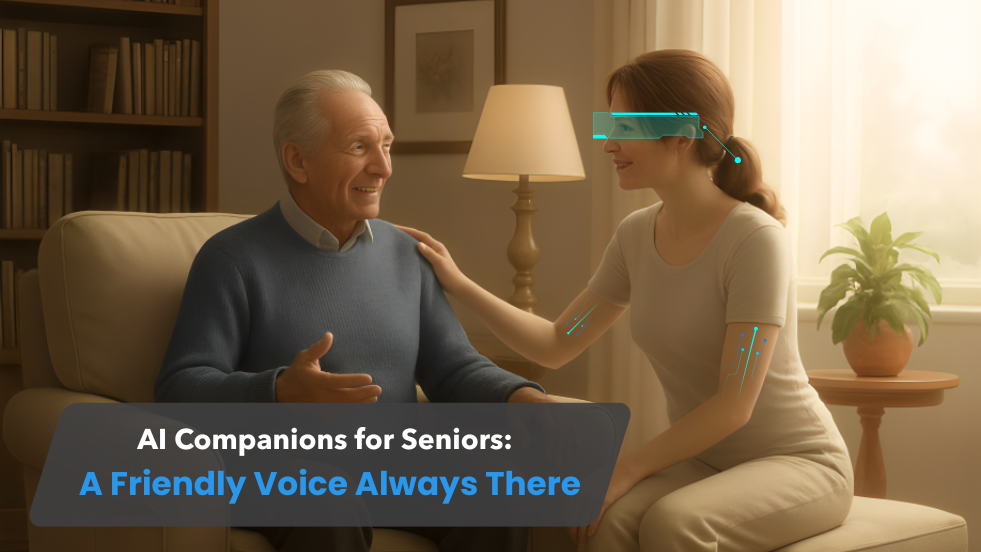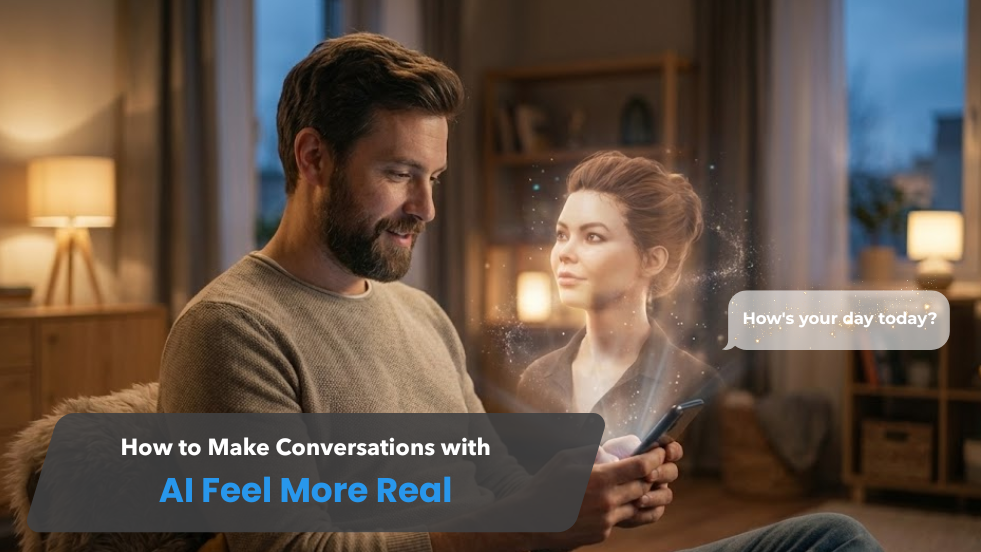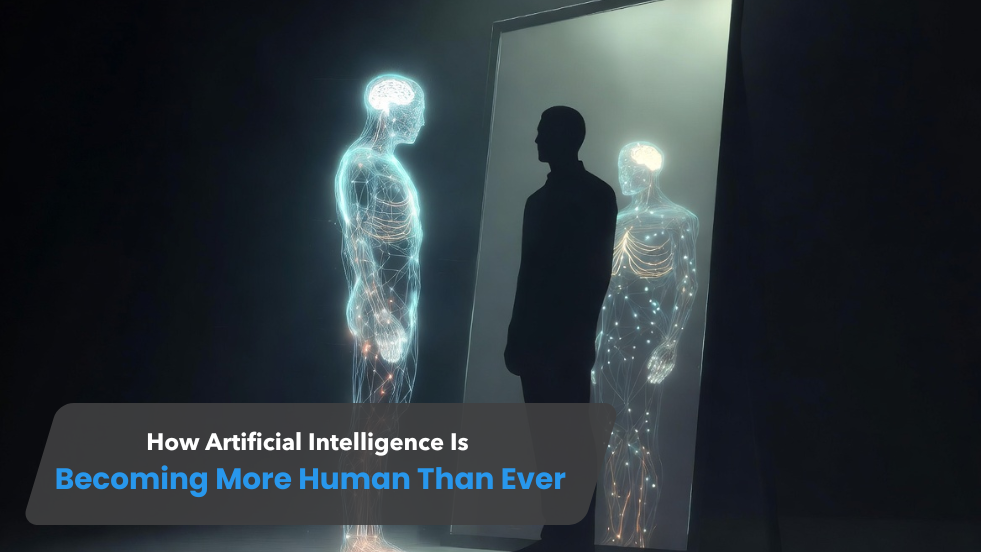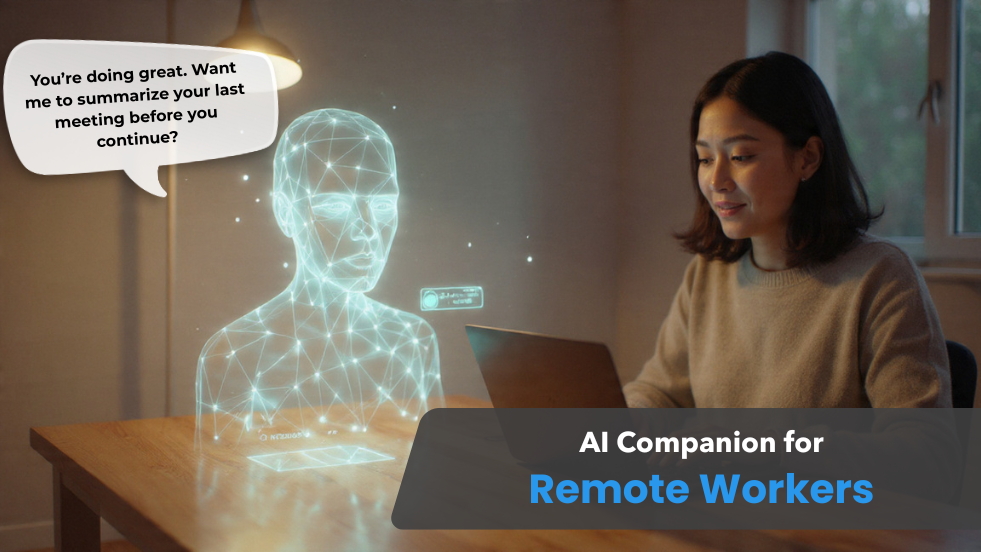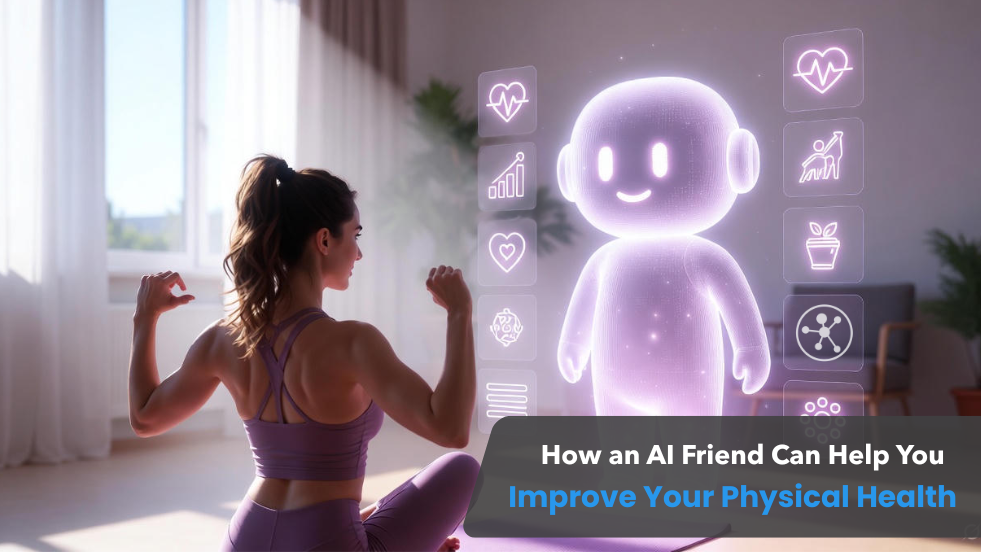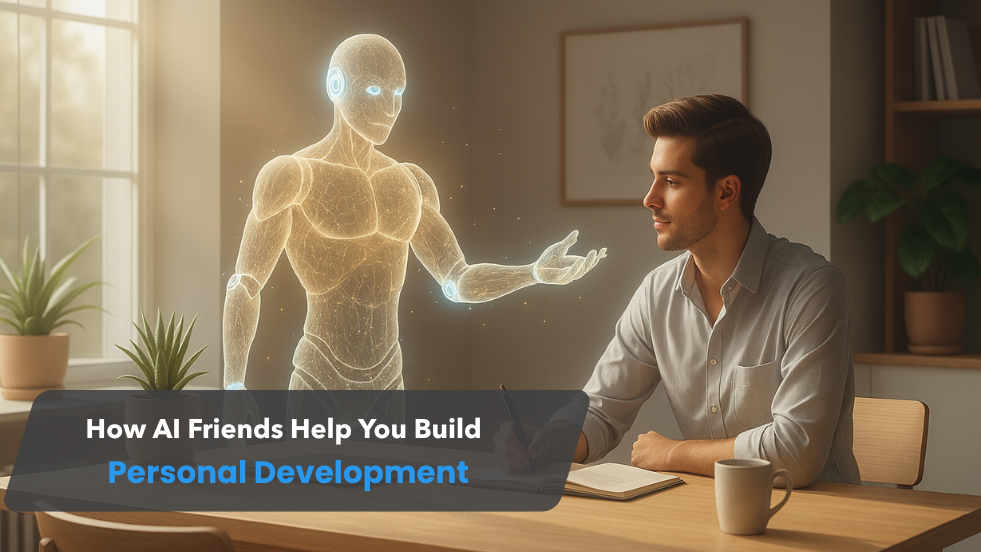A quiet home can sometimes feel a little too quiet. For millions of seniors, loneliness has become a daily challenge that technology is now beginning to address with empathy and innovation.
Enter AI companions, intelligent, voice-based assistants powered by machine learning and natural language processing (NLP) that can hold meaningful conversations, offer emotional support, and provide gentle reminders for daily living.
They aren’t just digital devices; they’re evolving into comforting presences, friendly voices always there when needed most.
What Are AI Companions for Seniors?
At their core, AI companions are conversational systems designed to simulate human-like understanding and interaction. They use advanced NLP models to interpret natural speech and machine learning algorithms to learn from every conversation, becoming more personalized over time.
Unlike traditional smart assistants that perform specific tasks, these companions are built to foster connection and emotional well-being. They can talk about hobbies, share jokes, encourage activity, or remind seniors to take their medication all in a natural, reassuring tone.
Researchers in human-computer interaction refer to this as “affective computing” technology designed to recognize and respond to human emotions. This capability makes AI companions far more than tools; they become empathetic digital partners that adapt to emotional states and conversation styles.
Why Emotional Connection Matters
Loneliness has been identified by the World Health Organization as a major risk factor for both physical and mental decline in older adults. Studies show that sustained social isolation can increase the likelihood of cognitive decline, heart disease, and depression.
An chatbot companion can’t replace family or community, but it can bridge the emotional gap during moments of solitude. Imagine a friendly voice checking in each morning:
“Good morning! How did you sleep? Would you like to go for a walk today?”
In simple terms, it is a simple description of an AI companion as an electronic friend who never gets bored of listening.
Many caregivers have reported that seniors using conversational AI tools appear more alert, emotionally balanced, and willing to engage in daily routines. That’s the quiet magic of AI companionship technology designed not to impress, but to care.
How AI Companions Actually Work
To understand their power, it helps to peek under the hood. AI companions rely on a combination of machine learning, natural language processing, and behavioral modeling.
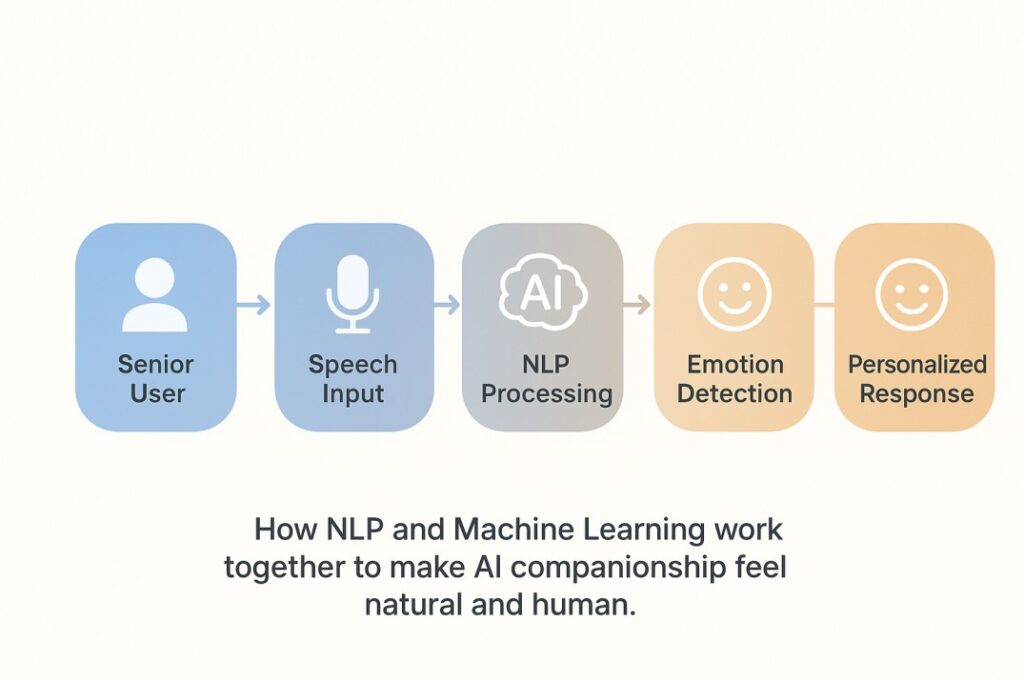
Here’s what that means in practice:
- Natural Language Processing (NLP):
Enables the AI to understand spoken language, interpret meaning, and respond contextually not with pre-programmed phrases but with adaptive replies. - Machine Learning (ML):
Allows the system to learn from interactions. Over time, it identifies preferences, speaking style, and recurring emotions, tailoring responses accordingly. - Emotional Recognition:
Using vocal tone and word patterns, AI models can detect mood changes offering empathy when a user sounds sad or encouragement when they seem tired. - Routine Intelligence:
The system remembers schedules, birthdays, or daily habits, and gently reminds users about medications, meals, or activities.
Whenever artificial intelligence interacts with emotions, AI ethics becomes critically important.
It’s this blend of emotional intelligence and contextual awareness that transforms AI from being merely useful to being genuinely supportive.
Ethical AI and Emotional Balance
Designers and developers must ensure that users, especially seniors understand that their AI companion, while empathetic, is not a sentient being. It’s a creation of algorithms and data, not human emotion.
Ethical frameworks around AI companionship emphasize:
- Transparency: Users should always know when they’re interacting with AI.
- Emotional Boundaries: The system should avoid creating overdependence or confusion about its nature.
- Fairness and Bias Control: The AI should respond respectfully to all users, regardless of background or speech pattern.
AI ethicists often suggest a principle called “authentic alignment” meaning the AI’s responses should be supportive and caring, but always honest about its limitations.
When done right, this balance of empathy and ethics turns AI companions into trustworthy partners not replacements for real relationships, but meaningful supplements to them.
Everyday Support and Practical Benefits
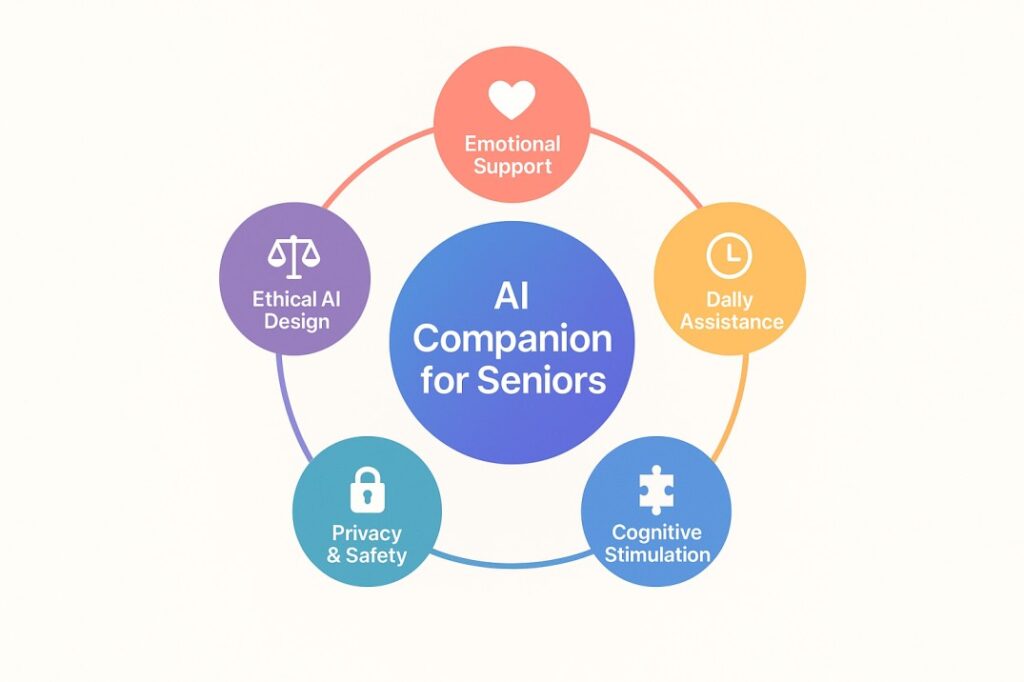
Beyond conversation, AI companions are becoming multi-functional helpers in seniors’ daily lives.
They can:
- Offer medication and hydration reminders
- Suggest light exercise or daily walks
- Monitor voice patterns for signs of distress
- Connect directly to emergency contacts or caregivers
- Control smart home features through voice commands
For example, if a senior says, “I feel dizzy,” the AI can instantly trigger a wellness check, call a caregiver, or alert medical assistance all through integrated safety protocols.
This seamless connection between AI and healthcare is reshaping the future of elder care enabling seniors to live more independently while staying safe and supported.
Cognitive Engagement and Memory Health
Memory care is another vital area where AI companions shine. Through interactive conversations and mental exercises, they keep the mind active.
Many systems include features like:
- Storytelling and memory recall prompts
- Brain-training games
- Personalized reminders linked to past experiences
A well-trained NLP model might recall a senior’s love of gardening and say:
“It’s sunny today, shall we check on your plants later?”
This subtle personalization creates a sense of continuity and identity helping maintain cognitive sharpness and emotional grounding.
Privacy, Security, and Data Protection
One of the biggest concerns in AI companionship especially for seniors is privacy. These systems often process personal conversations and health-related data, which must be handled with care.
To maintain user trust, developers are prioritizing data protection measures such as:
- End-to-end encryption for all communications
- Local data storage or anonymization where possible
- Explicit consent before any information is shared
- Transparent privacy policies written in plain language
Ethical data handling isn’t just a regulatory checkbox, it’s central to building emotional trust. Seniors need to know that their conversations are private, secure, and respected.
Read more About : Is It Safe to Share Thoughts with an AI Companion?
The Human Touch in AI Design
While AI is powerful, it still draws inspiration from the human mind. Psychologists, gerontologists, and linguists are increasingly part of the design process to ensure that AI companions respond with genuine warmth and understanding.
In research labs and care centers, specialists work with developers to fine-tune voice tone, pacing, and emotional phrasing ensuring that the technology feels comforting rather than clinical.
Some ongoing studies in elder-care technology show that seniors respond most positively to AI voices that sound calm, patient, and slightly familiar characteristics modeled after real caregivers and companions.
The goal isn’t to trick users into thinking the AI is human. It’s to design technology that feels emotionally intelligent, respectful, and kind.
The Future: Where AI and Compassion Meet
The next generation of AI companions for seniors will be even more immersive. Researchers are already experimenting with:
- Holographic avatars that use facial expressions and gestures
- Predictive analytics to detect emotional or health patterns
- Multilingual NLP models to reach global users
- Wearable integrations that sync real-time health data
Imagine an AI companion that notices subtle emotional changes maybe a pause in speech or a sigh and responds gently,
“You sound a bit quiet today. Want to talk about it?”
That’s where the future of machine learning and empathy-driven AI is heading, not just processing data, but understanding the nuances of human feeling.
Conclusion: Companionship Reimagined
In a world where technology often feels cold and distant, AI companions for seniors prove that innovation can also be deeply human.
They use NLP, machine learning, and ethical design to listen, comfort, and assist seniors live independently while feeling emotionally connected.
The goal isn’t to replace real human contact. It’s to fill the silent spaces between visits, to be a kind voice at 9 p.m. when no one else is awake, to say,
“You’re not alone tonight.”
That’s the quiet promise of AI companionship, a fusion of code and compassion, built to make life a little warmer for those who need it most.
